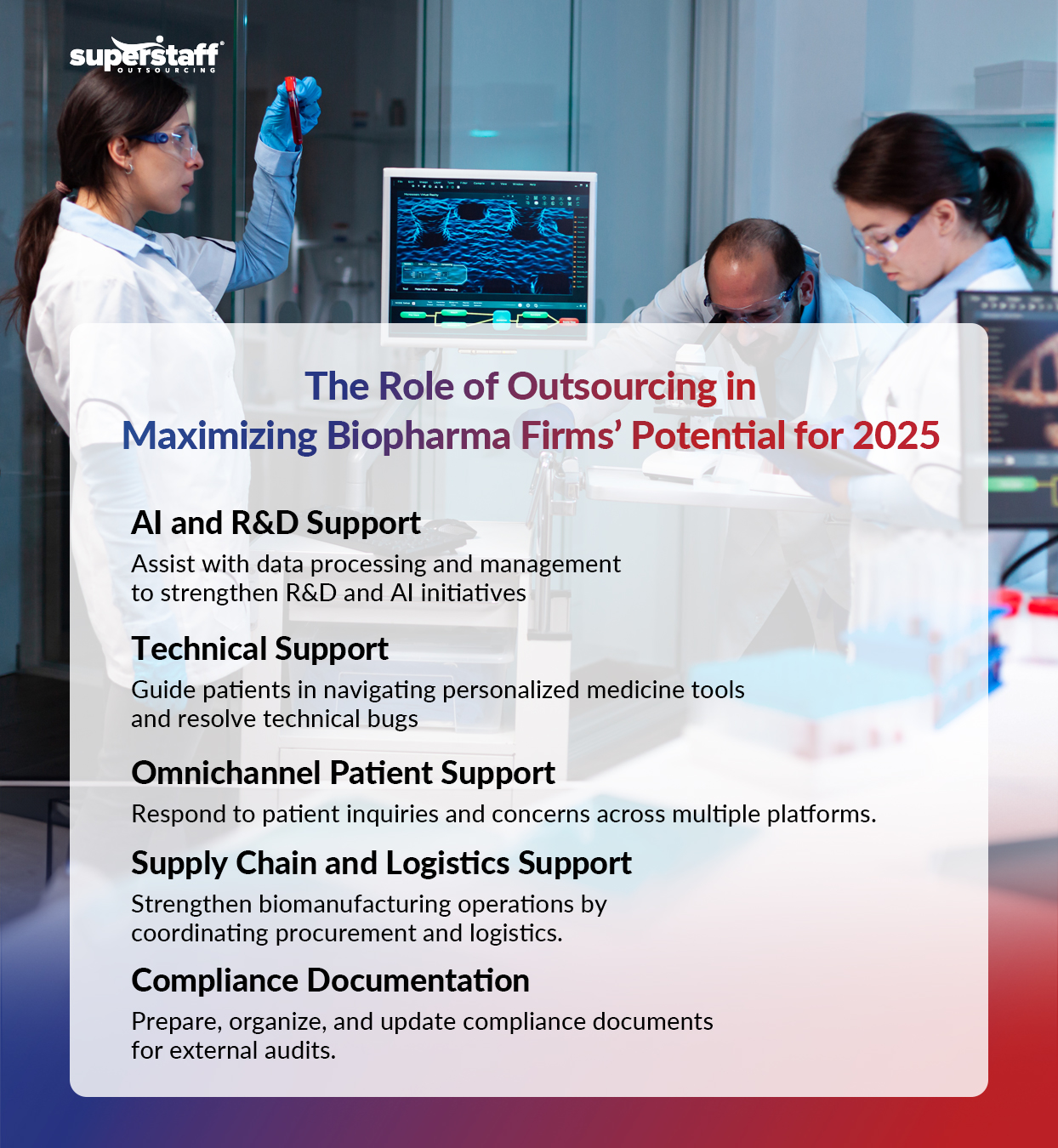
The biopharmaceutical industry is on the cusp of a transformative era driven by emerging trends that demand agility and innovation. From the rise of AI-powered R&D to the growing demand for personalized medicine, these advancements offer immense opportunities but also bring operational challenges.
To remain competitive and navigate the changes effectively, biopharma companies must better understand and embrace the critical industry trends and developments shaping 2025. At the same time, they must find and utilize innovative strategies to maximize their full potential amid times of uncertainty.
Through strategic outsourcing, biopharma firms can effectively capitalize on new developments, scale their operations to address rising demand, and maintain regulatory compliance while controlling costs. This blog will explore the top trends shaping the biopharmaceutical sector and how outsourcing to a BPO in the Philippines can empower these firms to rise above the competition.
Emerging Trends in the Biopharmaceutical Industry
In the past, the biopharmaceutical industry was dominated by large and well-established brands like Pfizer, Novartis, and Roche, each with a company value of between $159 billion and $230 billion. However, with the emergence of new technologies and innovations, the industry heavyweights are being upstaged by their tech-driven startup counterparts.
According to a recent Reuters report, new tech-savvy biopharma firms are threatening the dominance of industry giants. Several startups have added $270 billion to their combined market values over the past five years, while Big Pharmaceutical firms experienced a decline of $80 billion in the same period.
Brand name alone may no longer be enough to compete in today’s increasingly tight biopharmaceutical market. All industry players, big and small, must constantly replenish their stocks, invest in technology and innovation, and embrace new market opportunities to remain relevant and profitable. This starts by understanding emerging trends and finding ways to capitalize on them.

AI in Drug Discovery and Development
The first emerging trend that biopharmaceutical firms must pay attention to is the role of artificial intelligence (AI) in drug discovery. AI is revolutionizing biopharma companies’ research and development (R&D), enabling faster drug discovery and accelerating product launches.
Today, the average time-to-market for experimental drugs in the United States is 12 years. However, more biopharmaceutical companies are realizing the potential of AI for speeding up drug discovery, leveraging data to develop, test, and approve products in less than a year.
For this reason, industry experts foresee the healthcare AI market to reach $31.3 billion in the coming year. By analyzing precedents and keeping track of the changing regulatory landscape, biopharma companies can use AI to develop viable drugs and create effective go-to-market strategies.
Predictive Analytics for Patient Responses
Healthcare and biopharma companies increasingly rely on AI solutions to improve patient treatments and outcomes through predictive analytics. Artificial intelligence can process large amounts of data, using advanced algorithms to identify emerging industry trends, evaluate potential drug candidates, predict possible outcomes, and optimize clinical trials.
For some biopharma firms, AI-driven predictive analytics is being reviewed as a potential alternative to animal testing. AI software can use historical pre-treatment and post-treatment data for training to create forecasts or predictions of how a patient may respond to a particular medication.
Faster Identification of Molecular Targets
In addition to leveraging AI for predictive analytics, biopharmaceutical companies can also use it to examine a range of genetic information, such as biomarkers and molecular targets. With this data, they can more easily determine the appropriate medications and drug combinations for a patient, allowing for more tailored and effective patient interventions.
For example, one common pain point that many patients experience is having to take numerous pills to treat a single condition and its effects. Through AI software, biopharma researchers can examine active pharmaceutical ingredients (APIs), using genetic data to test different drug combinations to create one product that effectively treats a patient’s ailment.
Automation in Trial Monitoring
Beyond examining genetic data, artificial intelligence and other new technologies can potentially transform clinical trials. AI software can use data from medical records and health tracking applications to match patients with relevant clinical trials and help improve medication and treatment outcomes.
With the rise of Internet of Things (IoT) technologies and self-monitoring tools, patients can now easily monitor their health and share data with their providers. Industry experts predict that the growing demand for health and fitness tracking apps will cause the market’s size to skyrocket to $13,016.77 million by 2025, rising at a compound annual growth rate of 25.61%.
Leveraging these technologies, combined with AI-driven tools, biopharma researchers can monitor patient progress remotely, collecting data in real time for their clinical trials. They can track short- and long-term treatment outcomes, allowing them to thoroughly evaluate a drug’s effects on a patient’s condition and accelerate product development.
Personalized and Precision Medicine
As AI reshapes R&D, another critical trend is the rise of personalized medicine. One complex truth about medical intervention is that multiple patients often respond differently to the same treatments owing to diverse biological and lifestyle factors. A therapy that may be effective for one person may not work for another. As such, biopharma developers are realizing that giving patients personalized dosages, or the right combination of drugs, can create better treatment outcomes.
In line with this, more biopharmaceutical companies are exploring personalized medicine. Cited as one of Deloitte’s “Future of Biopharma” Trends, personalization in medicine requires healthcare providers to tailor therapies to an individual patient’s needs. They must use data-powered insights to effectively create customized drug combinations that would work for only a few people or just one patient.
Genomic Profiling for Specific Treatments
Advances in genomics and biotechnology can enable biopharma companies to develop these targeted therapies and improve outcomes for specific populations. With new technologies, researchers now better understand biomarkers and genetic markers, making it easier to identify subpopulations associated with broader disease categories. Thus, they can better develop drugs that target these conditions.
For example, Parkinson’s disease has several genetic subsets and mutations. Industry experts predict that further research can enable them to identify patient subsets based on differences in protein expression and genetic lesions, allowing biopharma firms to develop targeted therapies that cater to the unique needs of each subpopulation.
Reduced Adverse Effects Through Tailored Therapies
Biopharmaceutical companies use predictive analytics and data-driven technologies to analyze diverse patient populations and determine the optimal dosages for different subsets. By understanding which patients are most likely to respond well to which medications and under what conditions are necessary for positive outcomes, biopharma firms can reduce adverse effects and create customized treatment regimens.
Pharmacogenomics, the study of how genes influence how people respond to medications, will become crucial to the push for personalized medicine. Industry leaders predict that it may become part of patients’ medical records. With comprehensive pharmacogenomic data, biopharma firms can study how different individuals react to the same drugs, helping them formulate the precise dosages that will minimize side effects and toxicity while optimizing treatment effectiveness.
Growth in Patient-Centric Care Models
With the growing need for personalized medicine, healthcare and biopharma companies have shifted to more patient-centric care models. Medical providers and drug manufacturers must work together to create customized medications and treatments that target specific patient populations, leading to better health outcomes and fewer adverse side effects.
Technology and digital transformation will also play a role in the biopharmaceutical supply chain, providing greater visibility and transparency for patients. Much like in e-commerce, where customers can track deliveries after placing an order, biopharma companies can use track-and-trace technologies to provide updates and estimated delivery times to patients with personalized medication. These patient-centric models can help firms increase competitiveness while enhancing customer satisfaction.
Direct-to-Consumer (DTC) Engagement
While personalization focuses on patients, engaging them effectively through direct-to-consumer (DTC) models is equally vital. For many biopharma firms examining emerging trends, it may be easy to fixate on technological advancements. However, patient care and engagement are also crucial components of every real-world medical breakthrough – this is where adopting DTC strategies can be beneficial.
Direct-to-consumer models in the biopharmaceutical sector refer to the strategies used by companies to educate, engage, and retain patients directly. This patient-centric approach has become essential as many demand more accessible and transparent healthcare. Biopharma firms may use digital platforms to answer inquiries, respond to concerns, simplify complex terms for patients, and win their trust and loyalty.
Digital Platforms for Patient Interaction
Today’s patients have more options for deciding how and where to receive medical care. They use online review channels and forums to evaluate their healthcare providers and decide whether or not to take medications prescribed to them, helping them take a more active role in their treatment plan.
According to a Healthcare Trends Report, 72% of patients read online reviews before booking an appointment with a medical provider. Many also check product reviews and forums when deciding whether to take certain medications to help their condition.
With this more remarkable shift toward self-driven, personalized care, many biopharma companies are now leveraging digital platforms to engage with patients directly, answering their most pressing questions and concerns about their medications. To ensure comprehension, firms often simplify complex terms for lay audiences, allowing them to understand how their medications work more easily, the appropriate dosages, and potential side effects.
Many biopharma companies also use their platform to provide tools and resources for managing chronic conditions like diabetes, migraines, obesity, and more. This allows them to earn patients’ trust and, eventually, win their business.
Strengthening Patient Loyalty Through Direct Communication
As more biopharma companies engage with patients directly, brand loyalty becomes vital to their growth strategy. Direct communication through digital channels can help biopharma firms keep patients engaged with their products, raise awareness of new medications, and educate them on how best to manage their ailments and take charge of their health outcomes.
In addition to boosting brand trust and loyalty, direct communication with patients can shape product improvements and drug discovery by gathering feedback and listening to patient concerns. Access to real-time consumer insights can allow biopharma firms to tweak and refine drug formulations proactively, further boosting patient trust.
Biomanufacturing and Scalability
As engagement improves, biomanufacturing must evolve to meet the growing demand for biologics and advanced therapies. Biologics are drugs and medications created from living organisms, such as genes, proteins, and even donated human blood. These drugs are powerful for treating a variety of medical conditions for which no other treatments are available, such as multiple sclerosis, macular degeneration, cancer, and autoimmune disorders.
Because of their potency, there is a growing demand for biologics and other advanced therapies. As such, biopharmaceutical companies must scale up their manufacturing and distribution operations to meet this rising demand. In this case, scalable solutions and quality assurance become critical for maintaining supply chain efficiency.
Increased Demand for Contract Manufacturing Services
Many biomanufacturing firms opt for contract manufacturing to meet rising demand for specific drugs or products. This arrangement allows a third-party provider to handle manufacturing and distribution while companies focus on core activities like research and development. Another strategy can be to outsource back-office functions to lighten the load of their R&D team by providing much-needed administrative support.
Focus on Bioreactors and Cleanroom Technology
For biopharmaceutical firms to develop products safely and effectively, they’ll need proper bioreactors and cleanroom technologies. Bioreactors are devices or systems used to cultivate plant, animal, and other biological products in an optimal and controlled environment, while cleanrooms filter pollutants and airborne particles. Biopharma manufacturers must have these devices in place when developing drugs to prevent product contamination and preserve quality.
Ensuring Global Compliance in Production
In addition to scaling their operations and needing to invest in the proper safety devices, biomanufacturing firms face another challenge: ensuring regulatory compliance. Since biopharma companies ship their products to different countries, they must be mindful of international drug quality and safety standards, including proper storage, transportation, and handling.
Regulatory and Pricing Challenges
Amid these advancements, companies must also navigate shifting regulatory landscapes. Changing industry regulations and pricing pressures require biopharmaceutical companies to adapt and shift strategies to maintain market competitiveness.
For example, laws like the Inflation Reduction Act have reshaped drug pricing and reimbursement models, driving up operational costs for biopharmaceutical companies. In addition to pricing issues, firms must adhere to stringent product testing and quality assurance standards to ensure all medications are safe and effective for patient use.
Rising Costs of Compliance
During the pandemic, pharma and biopharmaceutical companies accelerated R&D to address the pressing need for COVID-19 vaccines and treatments. In the post-pandemic world, biopharma firms are contending with a significant operational slowdown, leading to widespread cost-cutting.
Many experts believe the Inflation Reduction Act played a massive role in the biopharma industry’s need for cost reduction. This legislation allowed Medicare to negotiate drug prices directly with manufacturers, leading to a $200 billion decline in annual drug sales and an increase in copycat generics.
Several industry heavyweights faced plummeting stocks as their key drugs went off-patent or faced steep competition from tech-driven alternatives. Two prominent examples are the cases of Pfizer and Bristol-Meyers. Last May, Pfizer announced their multi-year cost-cutting program, which aims to save them at least $1.5 billion within three years. Meanwhile, Bristol-Meyers laid off 2,200 jobs to save costs by the end of next year.
Need for Flexible Pricing Strategies
Many biopharmaceutical companies are shifting to flexible pricing strategies to address rising operational costs. Industry players previously set fixed price points for drugs and other pharmaceutical products. The problem with this is that it insulates the industry from the fundamental law of supply and demand.
If drug prices are too low, only the largest and most established companies can scale enough to meet demand without operating at a loss. Meanwhile, too-high prices create overstocked shelves and lead to fewer patients accessing needed medication, ultimately impacting companies’ bottom line.
Transitioning to a flexible pricing model can help biopharma firms adjust to changing market conditions and shifting patient demand. Prices bounce up during times of scarcity and decrease in moments of abundance. Firms can leverage technology to track real-time market changes, ensuring greater adaptability and cost control.
Importance of Demonstrating Therapy Value
When developing and marketing drugs, biopharmaceutical companies must demonstrate and prove that a product has “therapy value,” meaning that it is clinically proven effective in treating what it is intended to treat. The Food and Drug Administration (FDA) oversees the safety and efficacy of these medications, drugs, vaccines, and other biopharmaceutical products, ensuring they meet stringent quality standards and provide proven health benefits.
Complying with FDA regulations is necessary for biopharma companies, allowing them to continue doing business while building trust among providers and patients. At the same time, proving “therapy value” can also benefit firms, enabling them to address operational cost increases by adopting value-based pricing strategies.
The Critical Role of Outsourcing for Biopharmaceutical Companies
Having discussed the emerging trends in the biopharmaceutical industry, let’s move forward to how firms can leverage strategic outsourcing to navigate these new developments. Working with a BPO in the Philippines can help biopharma companies accelerate their R&D, support personalized medicine initiatives, improve direct-to-consumer engagement, and maintain regulatory compliance. Here’s how:

Outsourcing for AI and R&D Support
Biopharmaceutical companies can partner with a BPO that offers specialized and targeted solutions to address the rising demand for AI-driven research and development. The ideal outsourcing provider can connect firms with reliable and experienced artificial intelligence development support teams, enabling them to accelerate R&D and bring products to the market faster.
Expertise in Data Annotation and Analytics
Since leveraging AI software requires robust and well-organized datasets for proper training, outsourcing data annotation can help biopharma companies maximize their BPO partnership. Data annotation specialists label videos, images, and texts to make them easily readable for AI and machine learning (ML) models. These offshore teams can help convert clinical trial data from audio and video to text formats, allowing seamless AI integration.
In addition to handling data annotation, BPO providers can connect you with qualified healthcare data analysts. With these specialized professionals, biopharma companies can leverage predictive analytics to aid in drug discovery, optimize clinical trials, and facilitate better patient outcomes.
Reducing Operational Costs Without Sacrificing Quality
Beyond giving firms access to specialized expertise, a BPO in the Philippines can offer significant cost savings while effectively managing AI-driven R&D processes. By offloading tasks to offshore teams, biopharma companies can leverage economies of scale and tap into countries with more cost-effective labor and operating costs. At the same time, BPO teams undergo strict quality assurance and control, ensuring productivity and reliability while keeping expenses under control.
Compliance With Global Regulatory Standards
Because the biopharmaceutical industry is heavily regulated, firms must thoroughly research their outsourcing provider to ensure compliance with relevant standards and legislation. BPO companies that offer specialty healthcare outsourcing solutions keep up with industry developments and follow international standards in data protection, cybersecurity, and other relevant regulations.
Streamlining Personalized Medicine with Outsourcing
Beyond R&D support, BPOs also help streamline personalized medicine initiatives. To develop and execute personalized medicine programs, biopharmaceutical companies need robust data analysis and proactive support. Outsourcing providers can help with both tasks, managing complex datasets while offering crucial care and support for patients.
Patient Data Processing for Genetic Testing
Genetic testing is necessary to create personalized medicine programs. By identifying individual patient’s genetic information and biomarkers, medical providers can prescribe the correct drug dosages or combinations that will lead to the best possible health outcomes. Offshore outsourcing specialists can help collect, organize, and process patient data to prepare it for genetic testing and analysis, making it easier for biopharma companies to create personalized treatments.
Technical Support for Personalized Medicine Tools
To optimize personalized medicine programs, patients must send accurate health information to their medical providers. They may have to use IoT technology and health-tracking apps to collect and share real-time data. However, not all patients understand how to utilize these tools or may need assistance resolving technical bugs and issues. In these cases, having dedicated technical support specialists is necessary to guide patients when using these apps, allowing for a more seamless personalized medicine treatment.
Ensuring Patient Adherence Through Effective Communication
Effective communication is critical to the success of personalized medicine initiatives. As such, biopharma firms hoping to embrace this emerging trend must also invest in patient support. Through healthcare call center outsourcing, biopharma companies can allow patients to make inquiries, provide feedback, or ask for help whenever needed. Specialized BPOs can provide round-the-clock assistance, helping ensure adherence to personalized therapies while enhancing patient satisfaction.
Enhancing DTC Engagement with BPO Support
In previous sections, we mentioned the importance of direct-to-consumer engagement for the biopharmaceutical industry. Prioritizing proactive and direct engagement with patients can help firms build brand awareness, help patients take charge of their health by providing educational resources and tools, and foster trust and community.
With the right BPO in the Philippines, biopharma firms can refine their DTC engagement strategies and nurture better patient relationships. These offshore specialists speed up call response times, handle omnichannel communication, and help build educational campaigns online.
Multichannel Communication Strategies
To maximize DTC engagement, biopharma companies must meet patients where they are and allow them to interact in their preferred digital channels and platforms. Investing in omnichannel support is one effective strategy to enable seamless patient communication and guidance. By offering support across multiple channels, firms can provide greater convenience for patients and build trust with personalized care.
Educational Campaigns for Patients
By educating people about the best ways to prevent, manage, or address their health conditions, biopharma firms can build trust among potential and existing patients. With the right outsourcing team, companies can create targeted educational content and campaigns that address patient pain points, explain complex problems in easy-to-understand terms, and provide needed support and resources for urgent or emergency cases.
Improved Patient Loyalty Through Timely Responses
Quick responses are critical to good customer service but especially important for healthcare-related companies. Since access to needed medications can be a life-or-death situation for many patients, biopharma firms must proactively answer and resolve patient issues. Through a Philippine BPO, these companies can ensure timely responses to all inquiries and concerns, operating 24/7 across multiple channels to aid patients in ordering and securing their prescription medicines.
Supporting Biomanufacturing and Compliance
While patient engagement grows, manufacturing and compliance support are equally critical to addressing patient demand and preventing supply chain disruptions. Philippine BPOs offer specialized services for biomanufacturing operations, including order processing, logistics support, inventory management, and other critical back-office functions. With the right outsourcing provider, biopharma companies can strengthen their manufacturing operations, optimize their supply chains, and ensure regulatory compliance.
Coordinating Procurement and Logistics
To support biomanufacturing operations, outsourcing companies in the Philippines can coordinate procurement and logistics. This includes communicating with suppliers, managing accounts receivable and payable for smoother transactions, providing BPO dispatch services for seamless route planning, and responding to supply chain disruptions and other emergencies.
Quality Assurance for Global Standards
Since BPO companies often serve international clients, they stay updated on global industry trends, standards, and regulations. These offshore teams employ Quality Assurance (QA) specialists to oversee outsourced operations and ensure all processes and workflows comply with international legal requirements.
Scalability To Meet Production Demands
As demand for biopharmaceutical products grows, firms must scale up their business to meet consumer needs. However, not all companies have the in-house infrastructure and workforce needed to expand their capabilities while retaining product quality and ensuring safety and sustainability. The right offshore outsourcing partner can help biopharma firms upgrade operations and address growing demand.
Navigating Regulatory and Pricing Challenges with BPOs
Finally, BPOs in the Philippines can address regulatory challenges, helping biopharma companies remain competitive. In the era of constant disruption, having an outsourcing partner by your side can offer a significant advantage, enabling you to stay flexible and agile amid shifting market conditions and regulatory environments. Offshore specialists are experienced at navigating these complexities, providing crucial documentation support and market research insights to address your most pressing challenges.
Preparing Compliance Documentation
Proper documentation is essential to regulatory compliance. Biopharma firms must keep updated records of their workflows, processes, policies, and guidelines to ensure all aspects of their business meet relevant industry standards and global regulatory requirements. Outsourced back-office professionals can help prepare, organize, and update these documents, safeguarding the firm from potential penalties and violations.
Conducting Pricing Strategy Analyses
Firms must set the right price for their products to remain competitive in the increasingly tight biopharmaceutical landscape. If prices are too high, they risk alienating patients, but if prices are too low, it could impact their profitability and bottom line. By outsourcing financial services, biopharma companies can connect with accounting specialists who can conduct pricing strategy analyses and help them set the ideal price range to ensure competitiveness.
Adjusting to Evolving Laws Like the Inflation Reduction Act
The Inflation Reduction Act affected many biopharmaceutical companies’ operations, leading to widespread cost-cutting measures. Outsourcing to an offshore provider can help firms address the effects of the Inflation Reduction Act and other relevant legislation by enhancing flexibility and securing cost savings. With a BPO partner, you can upgrade or downgrade your operations depending on fluctuations in patient demand and shifting regulations, all while minimizing overhead expenses.
Maximize Your Biopharma Firm’s Potential With Help From a Reliable BPO in the Philippines
Outsourcing to Philippine BPOs helps biopharmaceutical companies address numerous emerging trends for 2025 and beyond. By combining innovation with operational efficiency, outsourcing supports AI-driven R&D, personalized medicine, DTC engagement, biomanufacturing, and regulatory compliance.
Take the first step toward biopharma success—partner with a trusted Philippine BPO today and stay ahead of the curve.
At SuperStaff, we offer a comprehensive range of specialty healthcare outsourcing solutions. As the BPO arm of a biopharma parent company, we are experienced in addressing your industry’s most pressing challenges and helping companies like yours adapt to fluctuating demand and shifting regulations.
Contact us for a quick consultation, and let’s discuss how we can help you unlock your full potential and embrace emerging industry trends.






